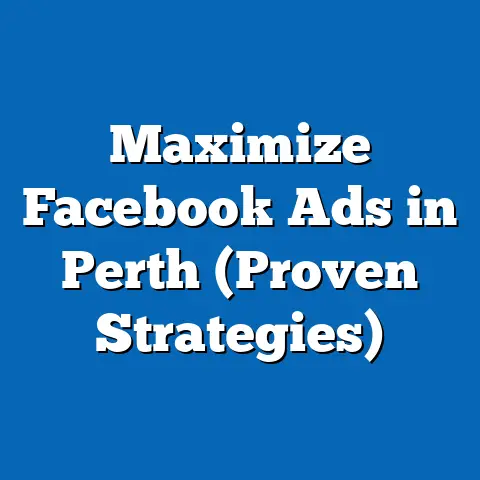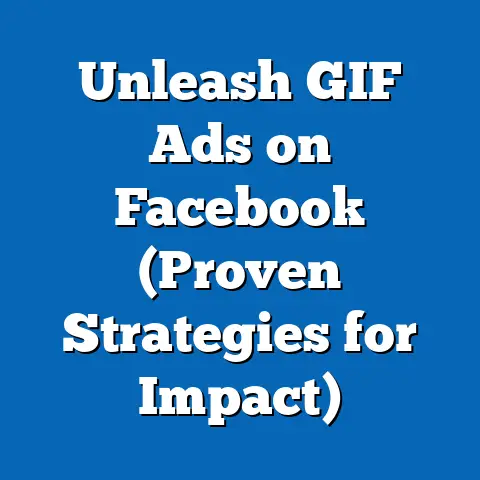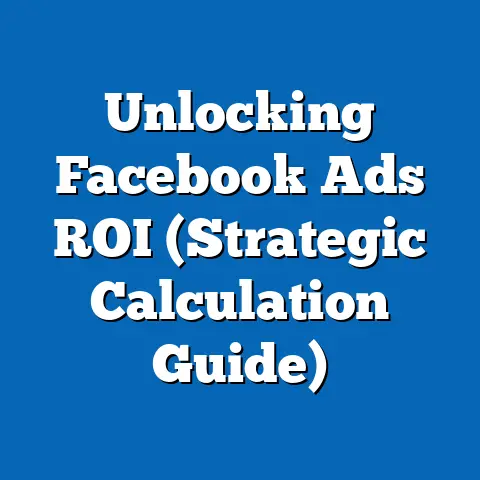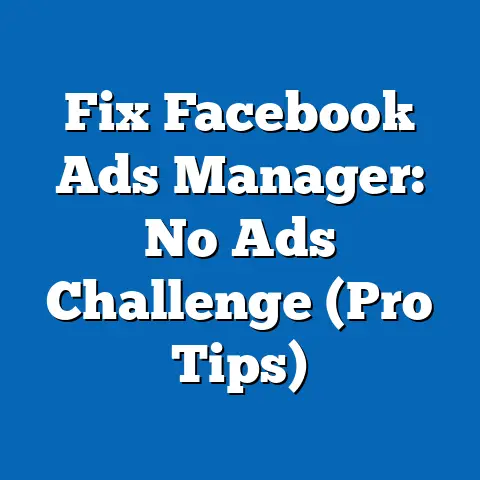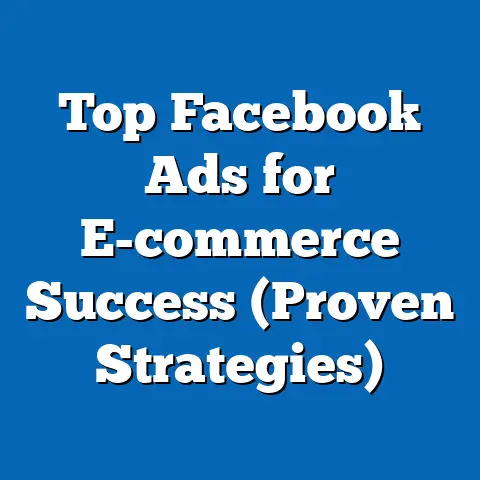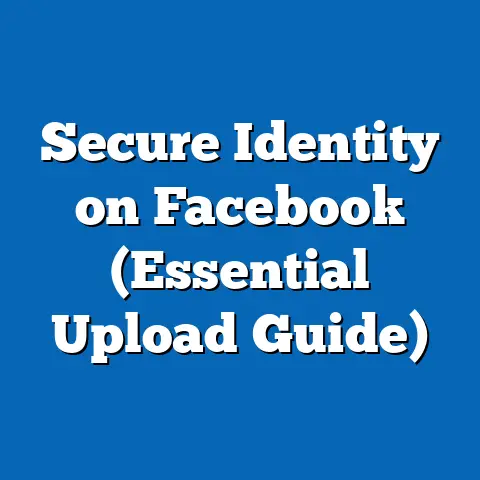Do You Need a Facebook Profile to Run Ads? (Clarifying Insights)
In the ever-evolving landscape of digital marketing, platforms like Facebook (now part of Meta) have become indispensable tools for businesses, entrepreneurs, and marketers aiming to reach vast, targeted audiences.
A common question that arises, particularly among newcomers to the platform, is whether a personal Facebook profile is necessary to run ads.
This article delves into this query with a comprehensive analysis, starting with a discussion on budget options for Facebook advertising, before addressing the core question and its implications.
Beyond the technicalities, we will explore the broader context of digital advertising as influenced by generational trends, technological advancements, and economic factors.
By weaving in historical context and societal impacts, this article aims to provide a nuanced understanding of how budget decisions and platform requirements intersect with user behavior and market dynamics.
Budget Options for Facebook Advertising: Defining Characteristics and Historical Context
Facebook advertising operates on a flexible budget model, allowing advertisers of all scales—from small businesses to global corporations—to participate.
One of the defining characteristics of Facebook’s ad platform is its customizable budget settings, which include daily or lifetime budgets, starting as low as $1 per day for certain campaigns.
This democratization of advertising spend emerged as a game-changer when Facebook Ads launched in 2007, initially under the name “Flyers,” targeting college students with low-cost promotional tools.
Historically, the platform’s budget flexibility reflects a broader shift in advertising paradigms during the early 2000s, when digital platforms began to challenge traditional media like print and television.
Unlike the high entry costs of legacy advertising, which often required thousands or millions of dollars for campaigns, Facebook allowed micro-targeting at a fraction of the cost.
This shift was catalyzed by the dot-com boom and the rapid adoption of social media, which saw over 100 million users join Facebook by 2008, creating a fertile ground for affordable, data-driven advertising.
The societal implications of this budget model are profound.
Small businesses and individual entrepreneurs, particularly from younger generations like Millennials and Gen Z, have leveraged these low-cost options to compete with larger entities, fostering innovation and economic inclusivity.
However, this accessibility also raises concerns about ad saturation and the ethical use of micro-targeting, as seen in controversies like the 2016 Cambridge Analytica scandal, where data misuse influenced political outcomes.
Budget options also reflect generational divides in marketing strategies.
Older generations, such as Baby Boomers, who may manage traditional businesses, often allocate larger budgets to blend digital with offline campaigns, while younger, tech-savvy generations prioritize cost-efficient, digital-first approaches.
This divergence underscores how budget flexibility caters to diverse economic realities but also highlights disparities in digital literacy across age groups.
Do You Need a Facebook Profile to Run Ads? Clarifying the Core Question
At the heart of this discussion is whether a personal Facebook profile is a prerequisite for running ads on the platform.
The short answer is no—you do not need a personal profile to run ads, but there are specific conditions and alternative pathways that must be understood.
Let’s break this down systematically.
Facebook’s advertising ecosystem is managed through Meta Business Suite and Ads Manager, tools that allow users to create, monitor, and optimize campaigns.
While historically, a personal profile was required to access these tools (as they were tied to individual accounts), Meta has since evolved its policies.
As of recent updates, businesses can create a Business Manager account without linking it to a personal profile, provided they have a verified business identity and adhere to Meta’s terms of service.
This shift was driven by user feedback and privacy concerns, especially after the implementation of stricter data regulations like the General Data Protection Regulation (GDPR) in 2018.
Many small business owners and agencies expressed reluctance to tie personal data to professional activities, prompting Meta to offer standalone business accounts.
However, for individuals without a formal business entity, a personal profile may still be necessary to initiate the process, as it serves as a gateway to creating a business page or ad account.
It’s worth noting that while a personal profile isn’t mandatory, having one can simplify the setup process, especially for beginners unfamiliar with Meta’s business tools.
A profile can also provide access to community insights and organic engagement data, which can inform paid campaigns.
Yet, this raises privacy considerations, as personal and professional boundaries may blur, a concern particularly resonant with younger users who prioritize data security.
Technological and Economic Factors Influencing Access and Budget Decisions
The ability to run ads without a personal profile is tied to broader technological and economic trends.
Technologically, Meta’s infrastructure has advanced to support standalone business accounts, reflecting a push toward user autonomy and privacy in the digital age.
The rise of cloud-based marketing tools and APIs (Application Programming Interfaces) allows third-party agencies to manage ads without direct access to personal data, further reducing the need for individual profiles.
Economically, the low barrier to entry for Facebook advertising—coupled with the option to bypass personal account requirements—has empowered a diverse range of advertisers.
For instance, freelancers and solopreneurs, often from Gen Z or Millennial cohorts, can launch campaigns with minimal investment and without compromising personal privacy.
This aligns with the gig economy’s growth, where over 36% of U.S.
workers participated in freelance roles by 2021, according to Statista, many relying on digital platforms for client outreach.
However, economic disparities play a role in how these tools are accessed.
Businesses in developing regions may lack the resources to verify formal business identities, pushing individuals to rely on personal profiles despite privacy risks.
This highlights a digital divide, where access to Meta’s advanced features often correlates with economic privilege, a trend that mirrors generational access to technology itself.
Generational Dynamics in Digital Advertising
Generational differences significantly shape how users approach Facebook advertising, including whether they feel comfortable linking personal profiles to ad accounts.
Baby Boomers (born 1946–1964), shaped by pre-digital marketing norms, may view personal profile integration as less intrusive, given their historical context of limited privacy expectations in business dealings.
However, their lower digital fluency can make navigating standalone business accounts challenging, often leading to reliance on personal profiles or third-party assistance.
Millennials (born 1981–1996), having come of age during the internet’s rise, exhibit a dual mindset.
They value digital tools for career growth—evidenced by 75% of them using social media for professional networking, per Pew Research—but are also wary of data overexposure following high-profile breaches.
This tension often leads to a preference for business-only accounts when available.
Gen Z (born 1997–2012), as digital natives, prioritizes privacy and efficiency.
Surveys, such as one from Morning Consult in 2022, indicate that over 60% of Gen Z users are skeptical of sharing personal data on social platforms, pushing them toward standalone business solutions.
Their fluency with technology also means they are more likely to experiment with minimal ad budgets, testing campaigns with as little as $5 to gauge effectiveness.
These generational nuances underscore that while Meta’s policies offer flexibility, user adoption varies based on comfort with technology, privacy concerns, and economic priorities.
This diversity within and across generations challenges the notion of a one-size-fits-all approach to digital advertising.
Societal and Cultural Implications of Platform Requirements
Socially, Meta’s evolving policies highlight a growing demand for transparency and user control in the digital realm.
The backlash against data misuse in events like the 2016 U.S.
election has fueled movements for digital rights, influencing how platforms design access requirements.
This is particularly relevant for younger generations, who advocate for data sovereignty and often drive policy changes through social activism.
In the workplace, the ability to separate personal and professional accounts impacts how businesses structure marketing teams.
Larger corporations may employ dedicated social media managers with business-only accounts, while smaller entities often rely on owners or employees using personal profiles, blurring professional boundaries.
This can lead to burnout or ethical dilemmas, especially when personal opinions expressed online conflict with brand values.
Historical Context of Social Media Advertising and Privacy Debates
To fully grasp the significance of Meta’s policies on ad account access, it’s essential to consider the historical trajectory of social media advertising.
When Facebook introduced ads in 2007, the platform was primarily a social networking tool, with advertising as a secondary feature tied to personal engagement.
The integration of personal profiles with ad creation was a natural extension of this model, as users were already sharing personal data willingly.
The 2010s marked a turning point, with the rise of data-driven advertising and subsequent privacy scandals.
The 2018 Cambridge Analytica incident, where personal data from millions of users was harvested without consent for political ads, sparked global outrage and led to regulatory frameworks like GDPR and the California Consumer Privacy Act (CCPA).
These events pressured Meta to rethink user access, culminating in options for standalone business accounts.
This historical context reveals a cyclical tension between innovation and regulation in digital advertising.
Each advancement—whether budget flexibility or account autonomy—has been met with societal pushback over privacy and ethics, shaping how platforms balance profitability with user trust.
Generational attitudes toward these issues vary, with older users often less critical of data sharing compared to younger cohorts who grew up amid these controversies.
Quantitative Insights: Usage and Budget Trends
Data provides a clearer picture of how budget options and account requirements play out in practice.
According to Meta’s 2023 advertising reports, over 10 million active advertisers use the platform, with small businesses accounting for a significant portion.
Approximately 70% of these advertisers spend less than $100 per month, highlighting the prevalence of low-budget campaigns enabled by flexible spending options.
On the privacy front, a 2022 survey by Statista found that 45% of global Facebook users are uncomfortable linking personal data to business activities, with the figure rising to 60% among Gen Z respondents.
This aligns with the growing adoption of Business Manager accounts, which Meta reports have increased by 25% since 2020, reflecting a shift toward professional-only access.
These statistics underscore the intersection of economic accessibility and privacy concerns.
While budget flexibility broadens participation, the demand for personal data separation signals a cultural shift toward digital autonomy, particularly among younger demographics.
Qualitative Perspectives: Expert Opinions and User Experiences
Experts in digital marketing offer valuable insights into the implications of Meta’s policies.
Dr. Sarah Thompson, a social media researcher at Stanford University, notes, “The move toward standalone business accounts is a response to a generational demand for privacy, but it also risks creating a two-tier system where verified businesses have more access than individuals.” This perspective highlights potential inequities in how policies are implemented across economic and generational lines.
User experiences further illuminate these dynamics.
A small business owner from Gen X shared in a 2023 Forbes interview, “I used my personal profile for years to run ads because it was simpler, but after a data leak, I switched to a business account.
The learning curve was steep.” In contrast, a Gen Z freelancer commented on Reddit, “I never linked my personal account—Meta’s business tools are intuitive enough, and I don’t want my data mixed up.”
These qualitative accounts reveal the diversity of user needs and the importance of platform adaptability.
They also emphasize that while policies may evolve, user education and accessibility remain critical to equitable adoption.
Workplace and Economic Implications
The ability to run ads without a personal profile has significant implications for the workplace and broader economy.
In professional settings, standalone accounts enable clearer delineation of roles, reducing the risk of personal liability for employees managing campaigns.
This is particularly relevant for agencies handling multiple clients, where data separation is essential for compliance with privacy laws.
Economically, the low-cost, accessible nature of Facebook advertising continues to drive entrepreneurship.
The U.S.
Small Business Administration reported in 2022 that social media ads, particularly on Meta platforms, are a primary marketing tool for 80% of startups, many of which operate on shoestring budgets.
The option to avoid personal profile integration further lowers barriers, encouraging participation from diverse socioeconomic backgrounds.
However, challenges persist.
Economic disparities mean that not all businesses can afford the verification processes or third-party tools needed for standalone accounts, potentially widening the gap between established entities and emerging players.
This mirrors generational trends, where older business owners may struggle with digital transitions, while younger ones capitalize on them.
Forward-Looking Insights: The Future of Digital Advertising Access
Looking ahead, the trajectory of digital advertising access on platforms like Meta will likely be shaped by ongoing privacy debates and technological innovation.
The rise of artificial intelligence in ad targeting may further reduce the need for personal data, as algorithms become more predictive and less reliant on user input.
This could accelerate the shift toward business-only accounts, aligning with generational demands for privacy.
Regulatory pressures will also play a role.
As governments worldwide tighten data protection laws, Meta may face mandates to decouple personal and professional access entirely, a move that could benefit users but complicate platform monetization.
The uncertainty lies in balancing user trust with revenue models, a challenge that has historically defined social media’s evolution.
Generational shifts will continue to influence these trends.
As Gen Alpha (born after 2012) enters the workforce, their expectations—likely even more privacy-focused than Gen Z—could push platforms toward radical transparency.
Meanwhile, aging populations may require simplified tools to stay competitive, highlighting the need for inclusive design.
Conclusion
In conclusion, while a personal Facebook profile is not strictly necessary to run ads, the nuances of Meta’s policies reflect broader generational, technological, and societal dynamics.
Budget flexibility has democratized advertising since the platform’s inception, empowering diverse users while raising ethical questions about data use and market saturation.
The option for standalone business accounts addresses privacy concerns but introduces new challenges around accessibility and equity.
Generational differences in digital literacy, privacy attitudes, and economic priorities shape how these tools are adopted, underscoring the diversity within and across age groups.
As historical events like data scandals and regulatory shifts continue to influence platform policies, the future of digital advertising remains uncertain but ripe with potential for innovation.
Ultimately, understanding whether a personal profile is needed to run ads is just the starting point.
The deeper question is how platforms like Meta can balance user needs with business imperatives, ensuring that advertising remains a tool for empowerment rather than exclusion.
As we move forward, ongoing dialogue between users, policymakers, and tech giants will be essential to navigating this complex landscape.

